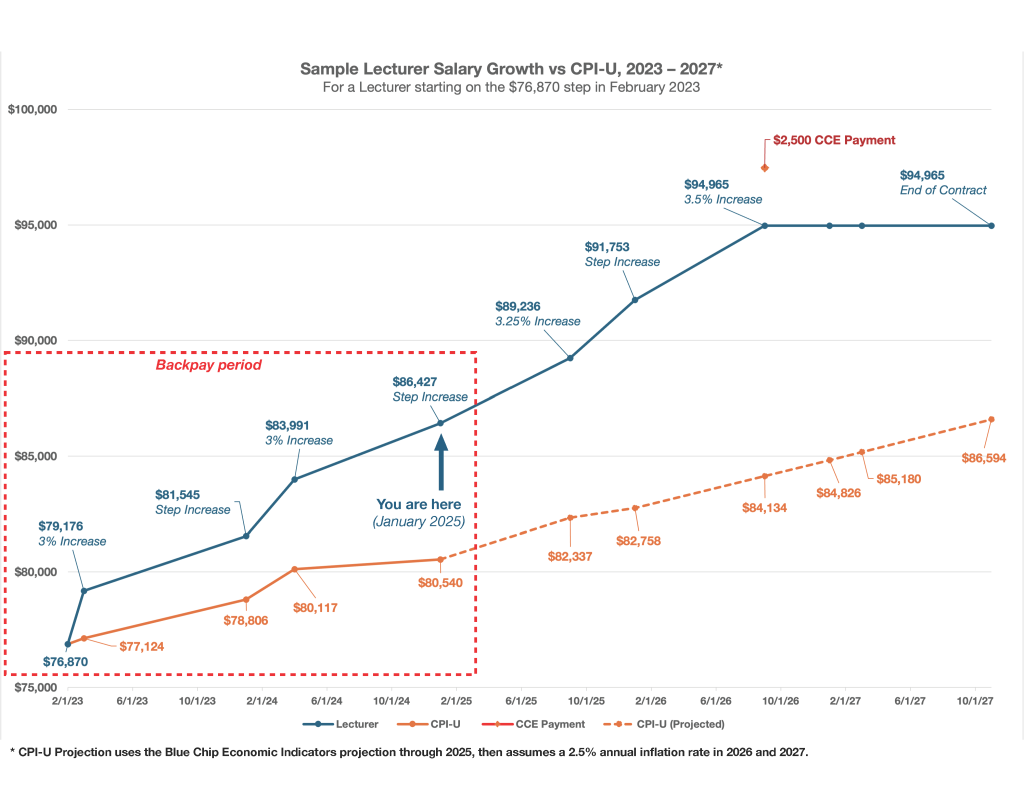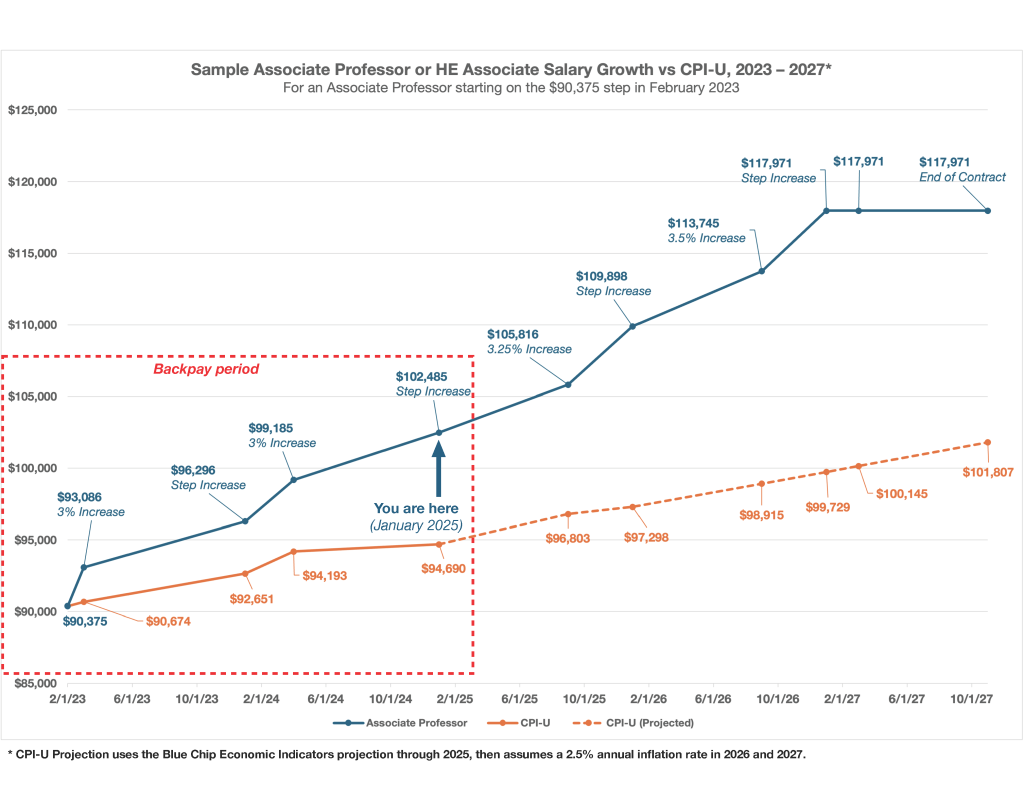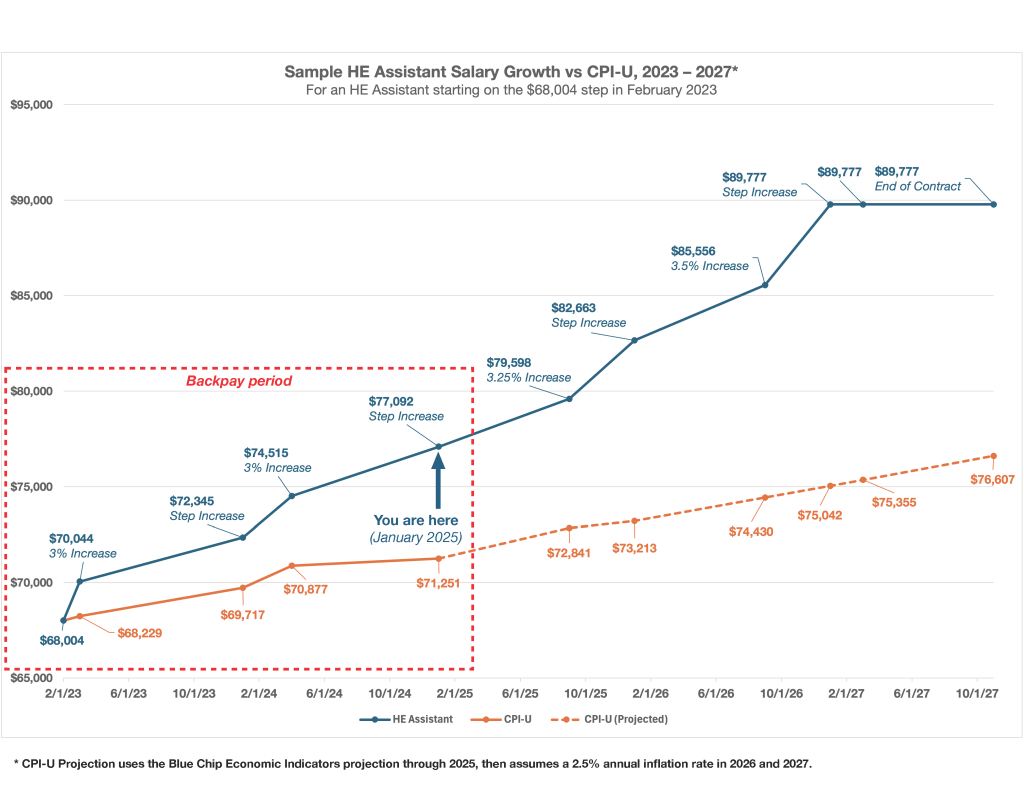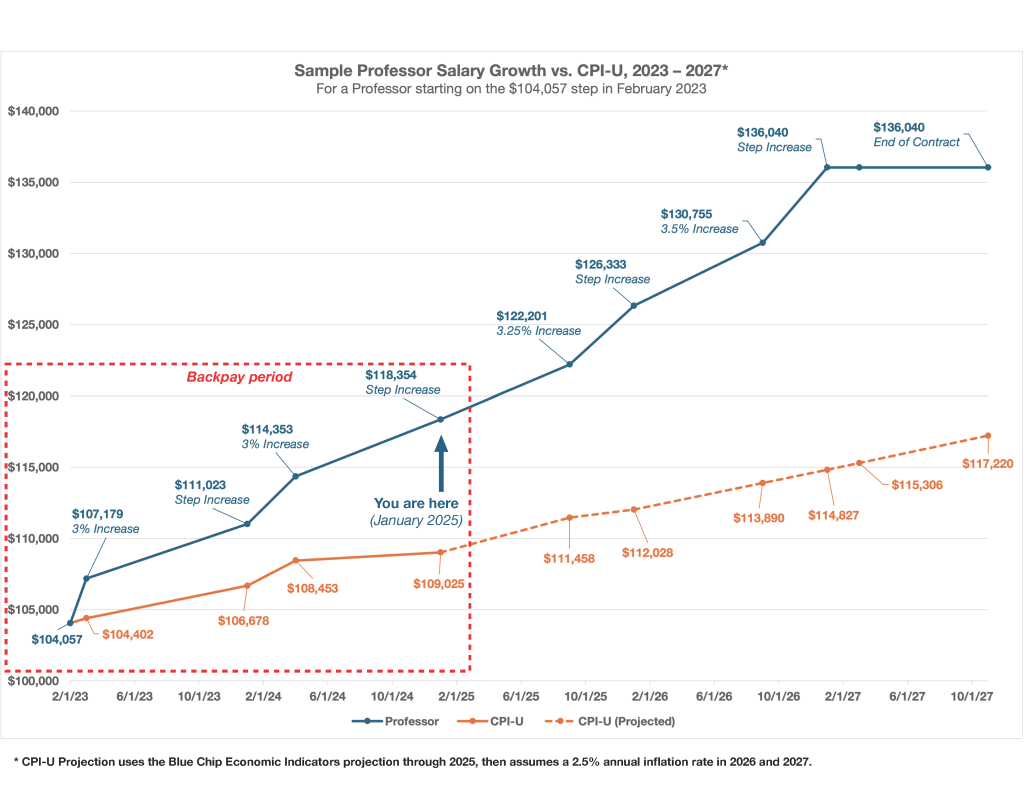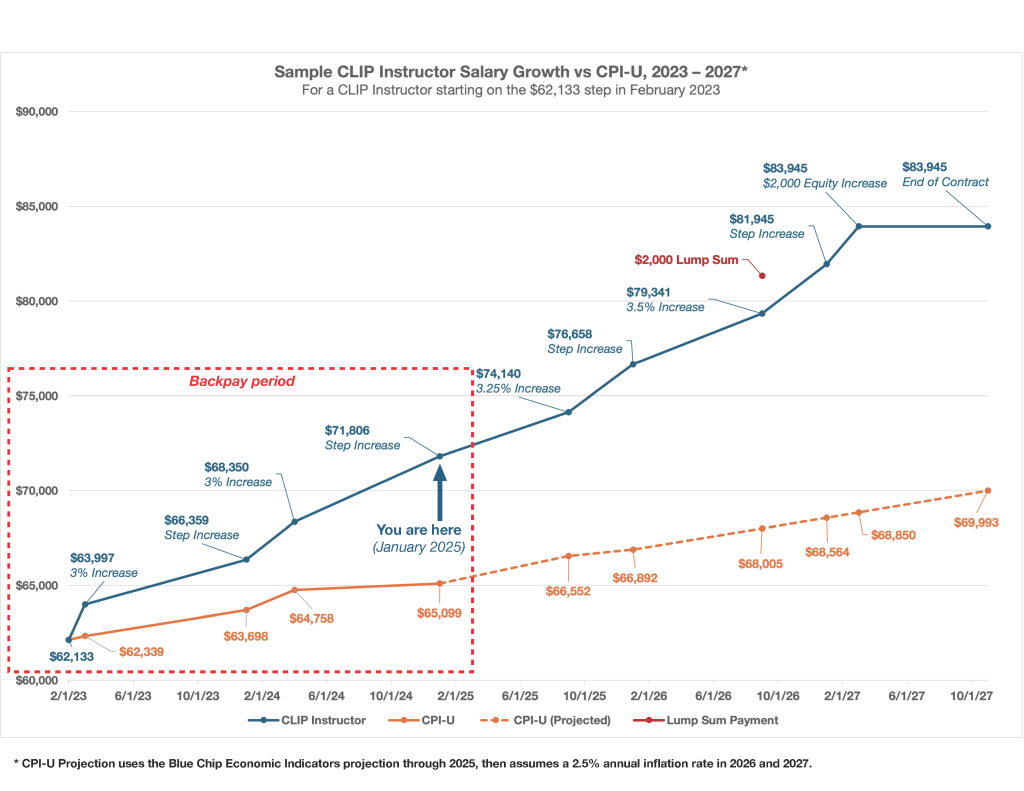
We’re proud to announce that the 30,000 faculty and professional staff represented by PSC will receive long-overdue raises, along with other contractual gains, because an overwhelming 90 percent majority of PSC members voted to ratify the new PSC-CUNY contract.
Schedule of Raises, Retroactive pay, and Ratification Bonuses
- May 15: $3,000 ratification bonus for eligible full-time employees paid by the state.
- May 23: $3,000 ratification bonus for eligible full-time employees paid by the city.
- July 24: Pro-rated ratification bonus for eligible part-time employees paid by the state.
- Aug. 1: Pro-rated ratification bonus for eligible part-time employees paid by the city.
- Aug. 1: Wage increases (not retroactive) for all eligible employees paid by the city
- Aug. 7: Wage increases (retroactive to 2023) for all eligible employees paid by the state.
- Aug. 15: Retroactive pay (to 2023) for all eligible employees paid by the city.
- Sept. 4: New salary increases (from Sept. 1 on) for eligible employees paid by the state.
- Sept. 12: New salary increases (from Sept. 1 on) for eligible employees paid by the city.
Read more about implementation from President James Davis here. If you have issues with retroactive payment, contact your campus HR or payroll person and copy [email protected]. If HR provides an unsatisfactory answer, contact your grievance counselor.
Ratification Bonus for Part-Timers
Ratification bonuses for eligible part-time employees paid by the state were paid Thursday, July 24. Eligible part-time employees paid by the city were paid their ratification bonus Friday, August 1.
If you have not received payment, or believe that you have received an incorrect amount, your first point of contact should be your campus HR or payroll person. Communicate with them before they reach out to the union. If HR provides an unsatisfactory answer, contact your grievance counselor immediately thereafter.
Eligibility: Adjuncts on payroll in both Fall 2024 and Spring 2025 are eligible for the ratification bonus.
Proration: An adjunct’s pro-rated bonus is based on their individual service record of teaching contact hours throughout CUNY in Spring and Fall semesters in 2024. The bonus for teaching adjuncts is a proportion of 24 teaching contact hours, the total workload of a full-time lecturer ($125 per teaching contact hour). However, if the adjunct’s total is 18 or more contact hours, that qualifies as full-time for purposes of the $3,000 ratification bonus. Eligible non-teaching adjuncts who worked 450 total hours during the Spring and Fall 2024 semesters qualify as full-time for purposes of the $3,000 ratification bonus, while those who worked less than 450 total hours will receive a proportion thereof ($6.67 per hour worked). Eligible Continuing Education Teachers who worked 900 total hours during the Spring and Fall 2024 semesters qualify as full-time for purposes of the $3,000 ratification bonus, while those who worked less than 900 total hours will receive a proportion thereof ($3.33 per hour worked). If a teaching adjunct also performed non-teaching adjunct service during the two semesters in question, that work also counts toward the calculation of the pro-rated bonus. But the maximum bonus amount is $3,000.
Retro for Part-Timers
CUNY management’s initial guidance on eligibility for retroactive pay required part-time employees to have been on payroll on January 13, 2025, the official contract ratification date. The PSC pointed out that this policy was unfair and inconsistent with our agreement because it effectively excluded from eligibility any part-timer who worked during the Fall 2024 and/or Spring 2025 semester but not in the January intersession. CUNY management has agreed to broaden the initial requirement so that any part-timer working in any title in both Fall 2024 and Spring 2025 is eligible for retroactive pay. That retroactive pay will cover any period worked since March 1, 2023, the first day of the contract. Eligible employees will receive their full retroactive pay on August 7 for those on state payroll and August 15 for those on city payroll. But management’s adjustment does not go far enough. The PSC has taken the position that our agreement entitles all part-time employees to retroactive pay for any period worked since the start of the contract, regardless of their status in the Fall 2024 and Spring 2025 semesters. We filed a grievance seeking to win full retroactive pay for all part-time employees who were not terminated or retired, and we will keep members apprised of our progress.
Economic gains
- Across-the-board salary increases of 13.4% over the course of the contract, with higher increases for several titles
- 3.0% on 3/1/23
- 3.0% on 4/1/24
- 3.25% on 9/1/25
- 3.5% on 9/1/26
- Retroactive pay beginning from March 1, 2023, day one of the contract
- A ratification bonus for all full-time employees ($3,000) and part-time employees (pro rata) who are on payroll at the end of Fall semester and start of Spring semester.
- Additional equity raises above and beyond across-the-board raises for faculty and professional staff in the College Laboratory Technician series, Assistants to HEO, and CLIP and CUNY Start Instructors
- Teaching adjunct salary increase to a minimum of $7,100 per 3 contact hour course and $9,467 per 4 contact hour course, professionalization of teaching adjunct role, and increases to the non-teaching adjunct hourly rate
- Graduate Assistant minimum salary increases totaling 29.2% for Grad A and 43.6% for Grad B along with significant raises for the C and D titles.
- Additional $1250 salary increases for members who are on the top step of a salary schedule who are not already receiving an equity raise greater than $1250, effective March 1, 2027
Rights and benefits
Member rights and benefits have been enhanced in the proposed contract. They include:
- With every promotion and reclassification, a raise of at least one step on the new salary schedule
- Paid parental leave program expanded from 8 weeks to 12 weeks and inclusion of foster parents, effective March 1, 2025
- A dedicated Health & Safety labor-management committee at every CUNY college
- Workload credit for adjuncts teaching “jumbo” classes equivalent to that of full-time faculty in the department or college
- CLIP and CUNY Start instructor benefits enhancements and pilot 2-year job security program for long serving instructors starting Fall 2025
- SEEK Directors and College Discovery Directors will join the PSC bargaining unit
- Department Chairs may carry over up to $6,000 of unused contractual research funds for up to four years after returning to the department faculty
- Outsourcing of teaching faculty/instructors of record to individuals outside of the instructional staff or to artificial intelligence is prohibited
- For the first time, HEO-series titles who have accumulated compensatory time may, through a defined process, either utilize the time or, by mutual agreement, receive pay for the extra hours worked.
- The remote work program continues for now pursuant to the Remote Work Agreement, but additional Remote Work provisions were not possible in the contract
- $4 million additional annual contribution to the PSC-CUNY Welfare Fund to maintain and enhance participants’ supplemental benefits
Professional advancement
Professional advancement was a priority that members expressed, and we made progress:
- A promotional path for full-time Lecturers (including Doctoral schedule) to become Senior Lecturers, and, effective September 1, 2026, a $2,500 payment upon attaining Certificate of Continuous Employment
- PSC-CUNY Awards maximum award increased to $7,000 and $15,000, depending on category of application
- Post-tenure reassigned time pilot program for tenured Assistant and Associate Professors to pursue scholarship
- CLT and Senior CLT at the top salary step will be eligible for a $2,500 Salary Assignment Differential
- HEO Assistants will be eligible for Advanced Degree Differentials, effective March 1, 2027
- HEOs who request reclassification will know that there is a PSC-appointed HEO on their college’s HEO Committee and that their request will get a response within 90 days
- A labor-management committee will consult on amending the Instructional Staff Code of Practice to clarify the CLT promotion procedure
- Hunter College Campus Schools sabbaticals policy and Service Credit policy improved
Labor-management committees for continued discussion
There are several issues around which we did not find agreement with CUNY administration, but instead secured a commitment to continue discussions under the new contract. These include:
- Graduate Assistant terms and conditions of employment
- Educational Opportunity Center workload
- Medical school faculty terms and conditions of employment
- Educational Technology
- Including adjuncts on paid parental leave
- Procedures around job abandonment and unpaid leave of over a year
- Library faculty reassigned time
- Clinical professor and distinguished lecturer terms and conditions of employment
- Enhanced opportunities for members in the CLT and Senior CLT titles to receive promotions
Title-Specific Summaries
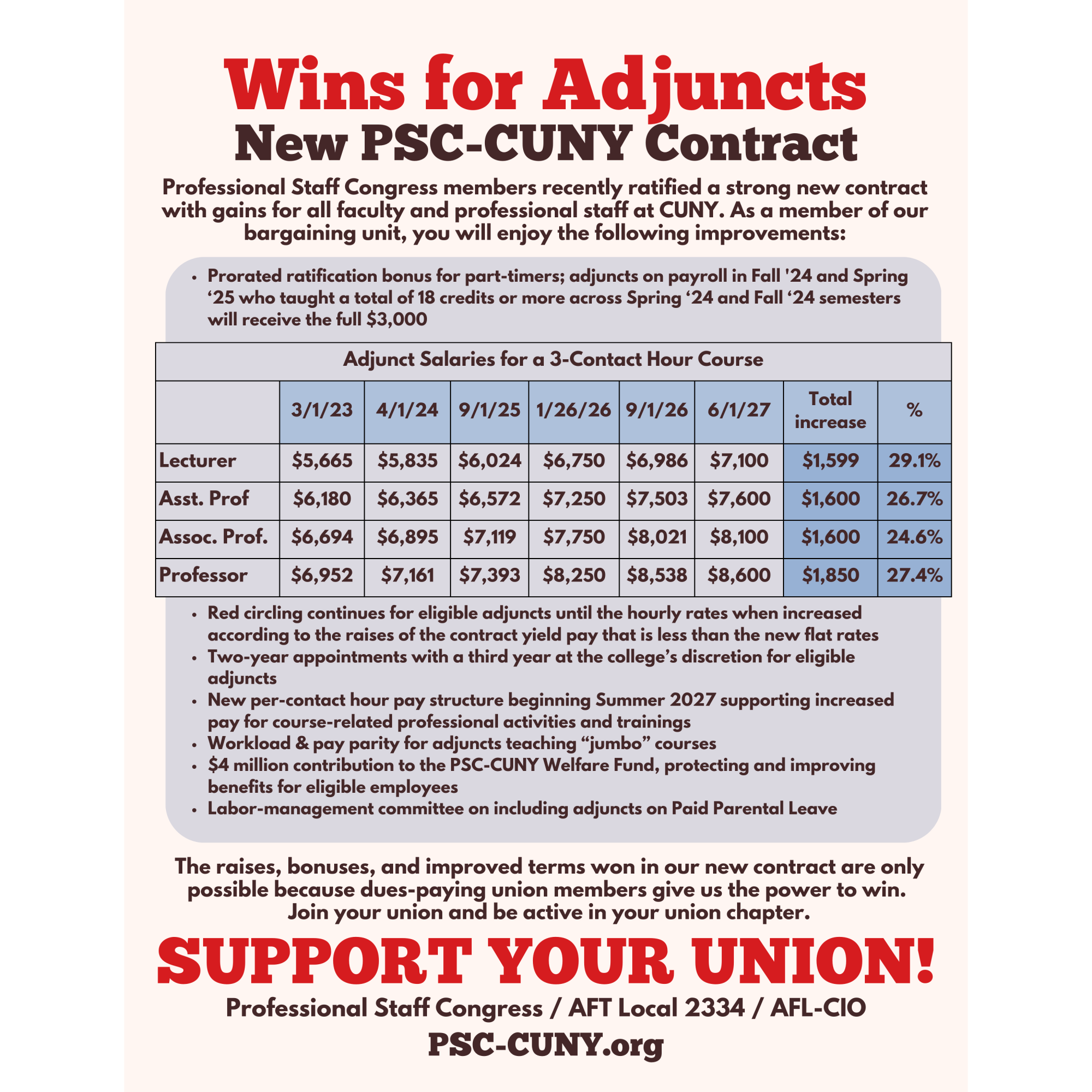

Wins for Adjuncts
- Across-the-board raises and nearly 2 years of back pay
- Ratification bonus pro-rated for part timers
- Minimum pay for a 3-contact hour course increases 29% from $5,500 to $7,100
- Two-year appointments with a third year at the college’s discretion for eligible adjuncts
- Flexibility in finding courses and NTA work to stay eligible; CUNY pays COBRA for a semester gap in insurance coverage
- New per-contact hour pay structure beginning Summer 2027 supporting increased pay for course-related professional activities and required trainings
- Workload & pay parity for adjuncts teaching “jumbo” courses
- $4 million contribution to the PSC-CUNY Welfare Fund, protecting and improving benefits
- Labor-management committee on including adjuncts on Paid Parental Leave


Wins for CLIP & CUNY Start Instructors
Download CLIP & CUNY Start Summary
- 13.4% across-the-board raises and nearly two years of back pay
-
$3,000 ratification bonus for employees who were on payroll at the end of Fall 2024 semester and start of Spring 2025 semester.
- Additional equity raise of $2000
- Enhanced benefits, including Travia Leave, Tuition Waivers, Paid Parental Leave, and more
- Pilot agreement on 2-year appointments for CLIP and CUNY Start Instructors
- Paid Parental Leave increased from 8 to 12 weeks
- $4 million contribution to the PSC-CUNY Welfare Fund, protecting and improving benefits
- New college-based labor-management committees to address local health and safety workplace issues
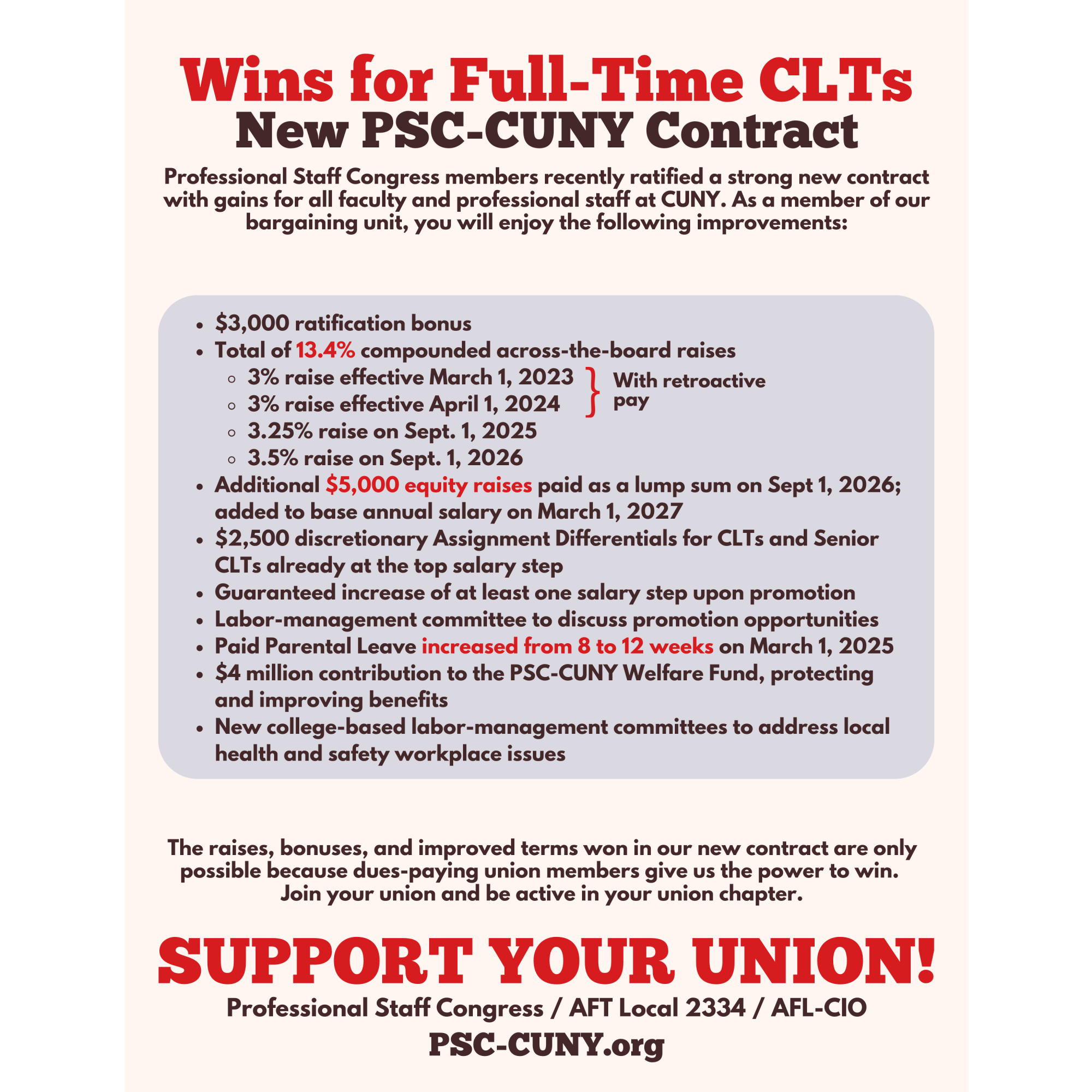

Wins for CLTs
- $3,000 ratification bonus for employees who were on payroll at the end of Fall 2024 semester and start of Spring 2025 semester, prorated for adjunct CLTs
- 13.4% across-the-board raises with nearly two years of back pay
- Additional equity raises of $5,000 for full-time CLTs
- Access to $2500 Assignment Differentials for CLT and Senior CLT titles at the top salary step
- Improvements to promotions process, and guaranteed increase of at least one salary step upon promotion
- Paid Parental Leave increased from 8 to 12 weeks
- $4 million contribution to the PSC-CUNY Welfare Fund, protecting and improving benefits
- New college-based labor-management committees to address local health and safety workplace issues


Wins for Graduate Assistants
Download Grad Assistant Summary
-
$3,000 ratification bonus for employees who were on payroll at the end of Fall 2024 semester and start of Spring 2025 semester, pro-rated for part-timers
- 13.4% across-the-board raises and nearly two years of back pay
- Additional equity raises of $4,000 for Graduate Assistants A and B; additional $1,000 for Graduate Assistants C and D
- Labor-Management committee to discuss Graduate Assistant terms and conditions
- New college-based Health & Safety Labor-Management committees


Wins for HEOs
- 13.4% across-the-board raises and nearly two years of back pay
-
$3,000 ratification bonus for employees who were on payroll at the end of Fall 2024 semester and start of Spring 2025 semester.
- Additional $1,000 equity raises for Assistants to HEO
- $1,250 salary increases for members at the top step.
- Extension of time for professional staff to use annual leave days from August 31 to December 31
- 60 days’ carryover or payout of unused comp time
- Salary Differentials of $1000 and $2500, respectively, for HEO Assistants with a masters/PhD in their field
- Paid Parental Leave increased from 8 to 12 weeks
- $4 million contribution to the PSC-CUNY Welfare Fund, protecting and improving benefits
- New college-based Health & Safety Labor-Management committees


Wins for Hourly Employees
Download Hourly Employee Summary
- Ratification bonus, prorated for part-timers
- 13.4% raises and nearly two years of back pay
- Additional equity raises of $2/hour for NTA I & II
- Additional equity raises $2/hour for Adjunct CLTs, Sr. CLTs, and Continuing Education Teachers
- New college-based labor-management committees to address local health and safety workplace issues


Wins for Lecturers
- 13.4% across-the-board raises and nearly two years of back pay
-
$3,000 ratification bonus for employees who were on payroll at the end of Fall 2024 semester and start of Spring 2025 semester.
- Lump sum payment of $2500 with Certificate of Continuous Employment, including current CCE holders
- Promotions to new Senior Lecturer title series with higher salary schedule
- $1250 added to the top salary step
- Guaranteed increase of at least one salary step upon promotion
- Paid Parental Leave increased from 8 to 12 weeks
- $4 million contribution to the PSC-CUNY Welfare Fund, protecting and improving benefits


Wins for Professors
- $3,000 ratification bonus for employees who were on payroll at the end of Fall 2024 semester and start of Spring 2025 semester.
-
13.4% raises, and nearly two years of back pay
- $1250 added to the top salary step
- Paid Parental Leave increased from 8 to 12 weeks
- Protections against outsourcing of teaching to artificial intelligence or to individuals not represented by our union
- Improvements to Department Chair Research Awards
- New Post-tenure Reassigned Time pilot program
- PSC-CUNY Research Award restructured, increasing awards and expanding access to course release time
- $4 million contribution to the PSC-CUNY Welfare Fund, protecting and improving benefits
- Guaranteed increase of at least one salary step upon promotion
Frequently Asked Questions
Additional Frequently Asked Questions will be added over the next few days.
CUNY management’s announced schedule for the implementation of the raises, retroactive pay, and ratification bonuses is as follows:
- May 15: $3,000 ratification bonus for eligible full-time employees paid by the state.
- May 23: $3,000 ratification bonus for eligible full-time employees paid by the city.
- July 24: Pro-rated ratification bonus for eligible part-time employees paid by the state.
- Aug. 1: Pro-rated ratification bonus for eligible part-time employees paid by the city.
- Aug. 1: Wage increases (not retroactive) for all eligible employees paid by the city
- Aug. 7: Wage increases (retroactive to 2023) for all eligible employees paid by the state.
- Aug. 15: Retroactive pay (to 2023) for all eligible employees paid by the city.
- Sept. 4: New salary increases (from Sept. 1 on) for eligible employees paid by the state.
- Sept. 12: New salary increases (from Sept. 1 on) for eligible employees paid by the city.
The implementation schedule was determined by CUNY management, the Office of State Comptroller (OSC), and the NYC Financial Information Services Agency and Office of Payroll Administration (FISA-OPA). When CUNY management failed to show appropriate urgency, the PSC continually pressed, organizing a boisterous picket outside a trustees meeting, directly contacting management and Comptroller DiNapoli regularly for two months, and testifying before the CUNY Trustees.
Some factors are out of the PSC’s control and are genuinely complex. For example, a teaching adjunct’s pro-rated bonus is based on their individual service record of teaching contact hours in Spring and Fall semesters in 2024. The bonus is a proportion of 24 teaching contact hours, the total workload of a full-time lecturer. However, if the adjunct’s total is 18 or more contact hours, that qualifies as full-time for purposes of the $3,000 ratification bonus. If a teaching adjunct also performed non-teaching adjunct service during the two semesters in question, that work also counts toward the calculation of the pro-rated bonus. And of course, many CUNY teaching adjuncts work at multiple campuses, including some who teach at both a community college and a senior college. None of this excuses the delays reflected in the implementation schedule, but it illustrates the level of complexity that the staff at the state and city navigate as they try to implement our contractual raises accurately and without errors.
Equity raises are increases in pay that are in addition to the “across-the-board” raises. One of the major economic victories of the proposed contract is that it provides equity increases in salary for Teaching Adjuncts, Non-Teaching Adjuncts and other hourly workers, Graduate Assistants, and full-time employees including the CLT series, Assistants to HEO, and CLIP and CUNY Start Instructors. See the chart below for a summary of equity raises:
| Schedule of Salary Increases for Titles Receiving Additional Equity Increases | ||||||
| 3/1/2023 | 4/1/2024 | 9/1/2025 | 9/1/2026 | 3/1/2027 | Total Increase 2023-2027 | |
| Assistant to HEO | 3.0% | 3.0% | 3.25% | 3.5% + $1000 lump sum | + $1,000 on base | Ranging from 14.8% to 15.6% |
| All CLT Titles | 3.0% | 3.0% | 3.25% | 3.5% + $5,000 lump sum | +$5,000 on base | Ranging from 18.46% to 23.9% |
| CLIP & CUNY Start Instructors | 3.0% | 3.0% | 3.25% | 3.5% + $2,000 lump sum | +$2,000 on base | Ranging from 15.5% to 17.4% |
| Grad Assist. A & B | 3.0% | 3.0% | 3.25% | 3.25% + $4,000 lump sum on 10/1/26 | +$4,000 on base | Ranging from 23.9% 43.4 % |
| Grad Assist C & D | 3.0% | 3.0% | 3.25% | 3.5% + $1,000 lump sum on 10/1/26 | +$1,000 on base | Ranging from 16.9% to 30.6% |
- Beginning March 1, 2027, NTAs I & II, Adjunct CLET, Adjunct Senior CLT, and CET-H will receive an additional equity increase of two dollars per hour.
- Top-step Assistants to HEO will receive the $1250 increase for members at the top step instead of the $1000 equity increase.
| Adjunct Salaries for a 3-Contact Hour Course* | ||||||||
| 3/1/23 | 4/1/24 | 9/1/25 | 1/26/26 | 9/1/26 | 6/1/27 | Total increase | % | |
| Lecturer | $5,665.21 | $5,835.16 | $6,024.80 | $6,750.00 | $6,986.25 | $7,100.00 | $1,599.80 | 29.1% |
| Asst. Prof | $6,180.00 | $6,365.40 | $6,572.28 | $7,250.00 | $7,503.75 | $7,600.00 | $1,600.00 | 26.7% |
| Assoc. Prof. | $6,694.79 | $6,895.64 | $7,119.75 | $7,750.00 | $8,021.25 | $8,100.00 | $1,600.20 | 24.6% |
| Professor | $6,952.50 | $7,161.08 | $7,393.81 | $8,250.00 | $8,538.75 | $8,600.00 | $1,850.00 | 27.4% |
*Compensation for courses other than three hours will be adjusted proportionally by the teaching contact hour. For adjunct lecturers, that will mean an increase of 37.7% from $6,875 to $9,467 per four contact hour course
Red Circled Adjuncts
Over the life of the contract, the red circling of adjuncts whose hourly rates exceeded the single rates established in the 2017-2023 contract will remain in effect. They will be held harmless and will receive the across-the-board raises. Their pay WILL NOT go down to match the new single rates. By the end of the contract, the scheduled increases in pay will overtake most of the red circled rates. When the increase due to the single rates is higher than the increase that would result from the across-the-board raises, the adjuncts will receive the higher single rate.
Our contract expired on Feb. 28, 2023. Two of the raises we just negotiated have taken place in these past two years so you are owed the difference. In the coming months, you will receive in your paycheck the amount of our past raises in one lump payment that is called retroactive pay.
Retroactive pay (back-pay) is the difference between what you were actually paid since our last contract expired and what you would have been paid if the new contractual higher rates had been in place at the time. Active full-time and part-time faculty and staff who have worked at CUNY since March 1, 2023 are due back pay, as are retirees for the portion of this period on payroll.
Retro for Part-Timers
CUNY management’s initial guidance on eligibility for retroactive pay required part-time employees to have been on payroll on January 13, 2025, the official contract ratification date. The PSC pointed out that this policy was unfair [and inconsistent with our agreement] because it effectively excluded from eligibility any part-timer who worked [at CUNY] during the Fall 2024 and/or Spring 2025 semester but not in the January inter-session. CUNY management has agreed to broaden the initial requirement so that any part-timer working in any title in both Fall 2024 and Spring 2025 is eligible for retroactive pay. That retroactive pay will cover any period worked since March 1, 2023, the first day of the contract. Eligible employees will receive their full retroactive pay on August 7 for those on state payroll and August 15 for those on city payroll. But management’s adjustment does not go far enough. The PSC has taken the position that our agreement entitles all part-time employees to retroactive pay for any period worked since the start of the contract, regardless of their status in the Fall 2024 and Spring 2025 semesters. We have filed a grievance seeking to win full retroactive pay for all part-time employees who were not terminated or retired, and we will keep members apprised of our progress.
The proposed contract includes a new pilot provision for multi-year adjunct appointments The vast majority of adjuncts at colleges around the country have no access to job security. This provision is a victory achieved in the face of management’s persistent efforts to undermine any stability for adjunct faculty and their refusal to renew the adjunct job security pilot agreement established and continued in the last two contracts. The new multi-year appointment is not the full job security that CUNY adjuncts deserve, but it is a binding, contractual bulwark against management’s vision of a vastly more precarious CUNY teaching force. There have been changes that benefit affected adjuncts and changes that acknowledge departmental needs.
The proposed contract would allow two-year appointments that may, after the first year, be extended to three-years at departments’ discretion. The number of semesters an adjunct must teach in order to qualify was extended by two semesters. But all adjuncts who qualified under the terms of the previous agreement, including in the year of its lapse, are grandfathered in. Adjuncts serving on a multi-year appointment will be able to look to other departments or colleges if their home department cannot offer a course they need to stay eligible. They will have more stable access to health insurance, too, thanks to a provision providing one-time COBRA payments from CUNY for up to one semester if an adjunct in a multi-year appointment is not assigned credit hours needed to stay eligible for health insurance. The union will keep pushing for a real certificate of continuous employment and job security for all adjuncts.
In securing continuation of adjunct job security, PSC members rejected management’s efforts to set us against each other. We mobilized ourselves and our allies in State and City government and in the labor movement to decisively reject management’s demand to more than double the time-to-qualify for a multi-year appointment from 5 years to 12 years.
Teaching adjuncts remain hourly employees through Spring 2027, and the minimum rate for teaching a 3-contact hour course (Adjunct Lecturer) will increase to $6,750 in Spring 2026 and $7,000 in Fall 2026. Beginning in Summer 2027, teaching adjunct pay will change from an hourly to a per-course/contact hour basis, and the minimum will increase again to $7,100 for a 3-contact hour course and $9,467 for a 4-contact hour course. Course-related professional activities and required trainings will be incorporated into the increased compensation, not counted against weekly office hours.
Examples of course-related professional activities include submitting one’s textbook information, learning the basics of the college’s learning management system, and completing the state-mandated workplace violence prevention online workshop. Service to the department or college is not a teaching-related professional activity. Here are some examples of service that are not part of an adjunct’s work:
- Committee Participation: Serving on hiring, curriculum, or governance committees.
- Program Review and Accreditation: Assisting with self-studies, accreditation documents, or program assessments.
- Advising and Mentorship: Providing academic or career advice to students outside assigned courses.
- Departmental Leadership: Acting as a program director or coordinating academic initiatives.
- Institutional Events: Organizing or attending conferences, workshops, or outreach activities.
- Community Engagement: Representing the department or college at external events.
Per-course salaries will depend on the number of contact hours and the adjunct’s title. Workload requirements to qualify for health insurance, tuition reimbursement and other workload-credit-based eligibility requirements will remain the same despite this change to the compensation structure in 2027.
The minimum pay for an adjunct teaching a three-credit course will be $7100 by 2027. That represents a 29.1% raise, and brings the base pay of an adjunct lecturer who teaches the same annual course load as a full-time lecturer within a few thousand dollars the full-time lecturer’s annual salary, depending on their salary step. Note that full-time lecturers, unlike teaching adjuncts, also have a service obligation on which they are evaluated. The PSC Bargaining Team has again prioritized equity raises for adjuncts and our other lowest-paid colleagues. Combating the crisis of contingency, winning pay parity, expanding access to full-time jobs, and defending adjunct jobs in periods of instability are fundamental to our union’s mission.
The University’s remote work policy has not changed as a result of the contract negotiations. The current Remote Work Agreement remains in effect. Renewed annually since the start of COVID, it provides a framework for arrangements between workers and their supervisors about the schedule and duration of remote work and guarantees certain protections when we are working remotely.
PSC fought hard to win something on remote work but we did not succeed. No New York state public-sector union has achieved contract language establishing an entitlement to remote work. It is very disappointing but it became increasingly difficult to move CUNY and NY State government to make PSC an exception to other state contracts and allow us to include anything about remote work in our contract. The Remote Work Agreement will continue to be in effect so we do have this benefit now and we will need to continue to emphasize to CUNY how important this issue is to us.
Remote work is embedded in modern workplace culture and is essential to CUNY’s staff recruitment and retention. It will remain a PSC priority. We have as strong a policy on hybrid and flexible schedules as any New York State union, but we know CUNY staff deserve more. We think we’ll be in an even better position on this issue in three years, when many of us will have been working remotely for nearly a decade.
The proposed agreement includes a two-part path for lecturer promotion
Part one: a lump sum payment on attainment of CCE
- Lecturers and Doctoral Lecturers including those at EOCs will receive a one-time lump sum payment of $2,500 if they attained a Certificate of Continuous Employment (CCE) prior to September 1, 2026. This lump sum will be paid on September 1, 2026 to all full-time Lecturers who have earned a CCE as of the disbursement date. Lecturers and Doctoral Lecturers including those at EOCs who attain a CCE after September 1, 2026, will also receive a lump-sum payment of $2500.
Part two: new Senior Lecturer titles
- CUNY will establish the title of Senior Lecturer, with a higher salary schedule than Lecturer, and a corresponding salary schedule for Senior Doctoral Lecturer. CUNY will work with college P&Bs to establish the qualifications and criteria for promotion. Lecturers and Doctoral Lecturers will be eligible to be considered for promotion to a Senior Lecturer or Senior Doctoral Lecturer at the conclusion of one’s 8th year of continuous employment. The promotion would take place on September 1st of the 9th year. They would be moved up one step on the new salary scale. Lecturers/Senior Lecturers who attain their terminal degree shall be eligible for consideration for a promotion to a Senior Doctoral Lecturer. For those already past their 9th year of continuous service, Lecturers and Doctoral Lecturers will be eligible to be considered for promotion. Lecturers and Doctoral Lecturers not promoted to a Senior title in their 8th year of service will remain eligible.
Converting Clinical Professors and Distinguished Lecturers to Doctoral and Senior Doctoral Lecturers
Clinical Professors and Distinguished Lecturers may be eligible for appointment as Doctoral Lecturers and Senior Doctoral Lecturers. When that takes place, they’ll be placed on the step that is closest to their existing salary. If their salary is higher than the top step of the Senior Doctoral Schedule, upon notification to and agreement of the PSC, the salary shall be maintained and they’ll earn future across the board raises.
Senior Lecturer Salary ScaleEffective 9/1/25 (Assumes 3.25% GWI on 8/1/25) |
Senior Lecturer Doctorate Salary ScaleEffective 9/1/25 (Assumes 3.25% GWI on 8/1/25) |
| $70,642 | $73,469 |
| $73,800 | $76,937 |
| $76,310 | $79,598 |
| $79,877 | $82,663 |
| $82,389 | $86,741 |
| $84,911 | $90,838 |
| $87,420 | $94,909 |
| $89,933 | $98,995 |
| $92,454 | $102,017 |
| $94,967 | $109,025 |
| $97,487 | |
| $101,040 | |
| $107,686 |
For the first time, HEOs who have accumulated compensatory time may, through a defined process, either utilize the time or, by mutual agreement, receive pay for the extra hours worked.
HEOs assigned to work more than 35 hours per week will be able to 1) carryover of unused comp time for up to 60 days beyond the current deadline of 30-days beyond the end of the quarter in which it was earned, or 2) payout of unused comp time by mutual agreement of the employee and the college.
The across-the-board raises of the contract keep pace or slightly exceed inflation in the contract’s own period to date. The raises for our lowest-paid colleagues exceed the public-sector pattern and beat inflation thanks to the equity raises they will receive. Our annual step raises combined with the across-the-board raises also beat inflation. But members receiving only the across-the-board raises will not exceed inflation. None of New York’s public-sector unions have negotiated across-the-board increases that overcome the recent pandemic-driven inflation. The ratification bonus ($3,000 for full-timers, prorated for part-timers) is meant to ease the sting of inflation.
Comparisons of Sample Member Salaries to Inflation Over Term of Contract
These charts compare the growth in salaries that members in certain titles will experience over the course of the proposed contract (shown in blue) with the projected rise in the consumer price index, a measure of inflation (shown in orange). Between across-the-board contractual raises and regular step increases, the sample members would all enjoy raises that significantly outpace the projected inflation between 2023 and 2027.
